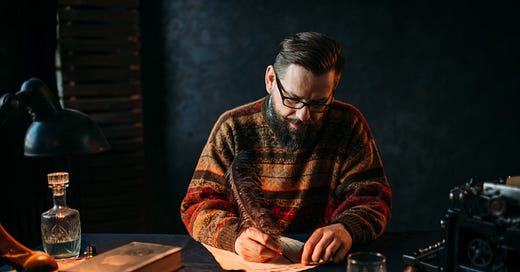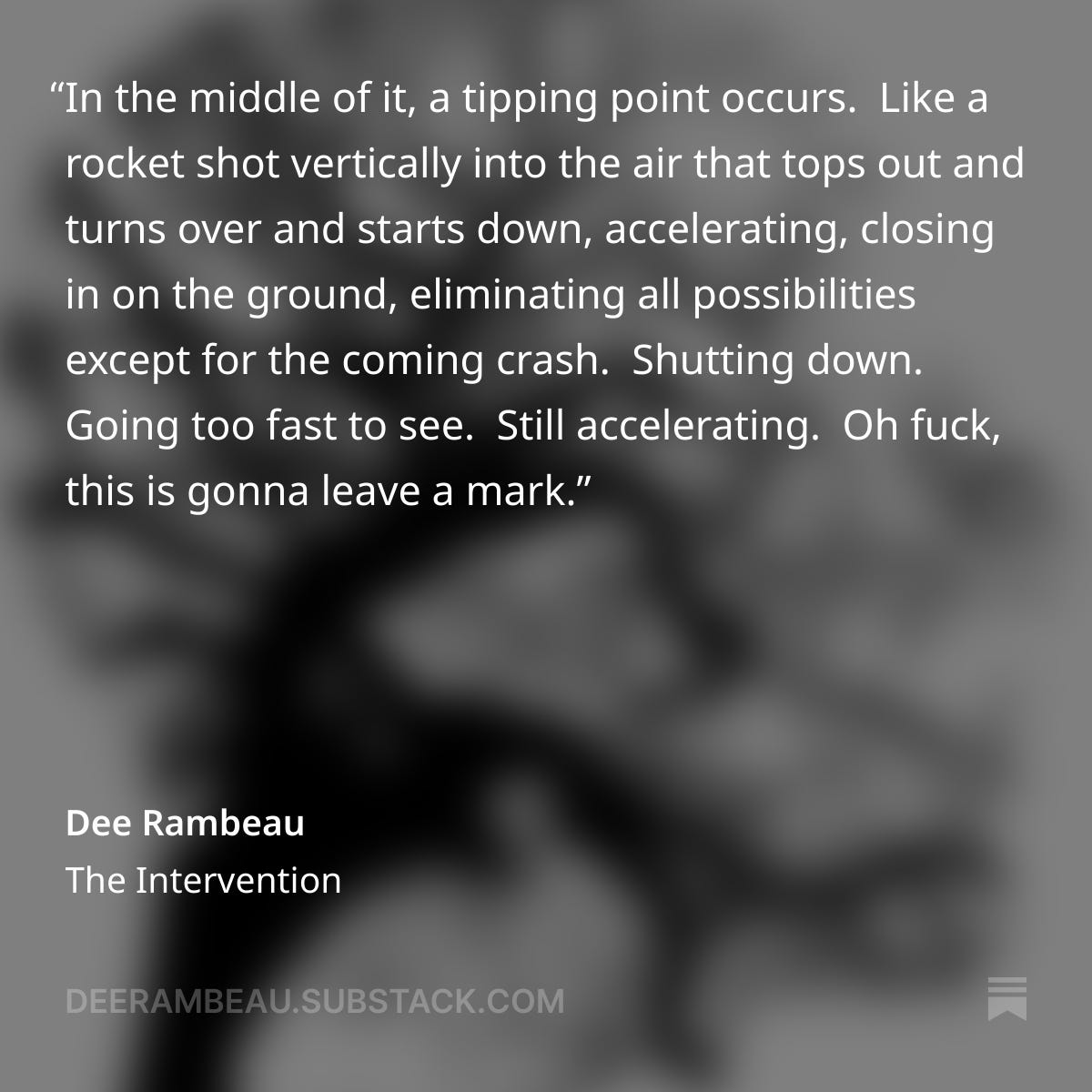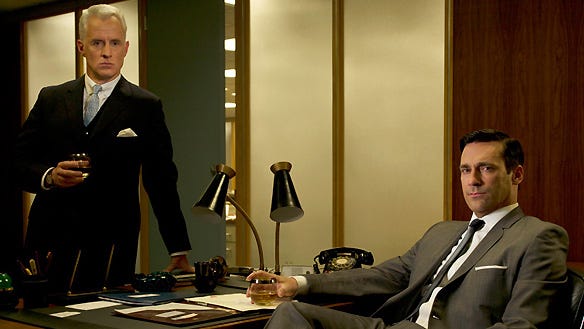Today’s offering is a lightly edited reissue of a post from September 2023. If you read it then, thanks for taking another look. If you didn’t, I hope you find it interesting.
Hello friends! (in my best Jim Nance impression) Let’s make one thing clear: none of what you’re about to read is a criticism. I don’t do “should” or “shouldn’t” as I hope I’ve made abundantly clear in a recent post.
I am an observer of human behavior, including my own. The lens through which I see the world is as an experienced sober guy. Experience in living. Experience in recovery. Of a Sober Mind get it? I knew you would.
The world is. Sometimes it sucks and it hurts.
Human beings are. They need things to cope.
Change is hard. When the cope stops working.
I accept that.
My writing is meant to surface my own internal dialogue into some kind of clarity and hopefully poke you into a little bit of your own thinking on the topic at hand. And maybe laugh or cry a bit—depending on your own state of mental health in this moment.
The romance of addiction? You bet.
Romantic myths about drinking as a sophisticated behavior abound. Songs are sung. Poems are written—entire books in fact. Setting aside for a moment the creative energy spent writing ABOUT addiction, consider the prodigious output of content written by authors, songwriters, and poets under the influence of addiction. Booze and drugs have fueled legion of creative geniuses. Fueled them until it killed them. Literally. Directly.
Sinclair Lewis
Eugene O’Neill
Ernest Hemingway
John Steinbeck
Charles Bukowski
Edgar Allan Poe
F. Scott Fitzgerald
James Joyce
Dorothy Parker
Jack Kerouac
Hunter S. Thompson
John Keats
Charles Dickens
Aldous Huxley
Tennessee Williams
Each of these artists/writers found fuel, pain, and the inescapable entertainment value out of writing while under the influence—or writing about being under the influence—or both.
We may be entertained by their experiences. We may learn from them. To model our creative (or otherwise) lives after them would be to go down a dangerous path. But many do.
There is nothing romantic about addiction. When does it cross over from a simple coping behavior to a full-blown dependence? Simple. When it has you instead of you having some of it. The romance of our coping mechanisms is generally found in the early days. When the substance or habit lifts us. We perceive a new light—new angle—new courage perhaps as a result of the opening up that occurs when you first get fucked up and realize it works for you. Here’s my image of the progressive cycle that occurs for many.
Late-stage addiction is certainly not romantic. The kind where a person cannot live without it. Where it dominates all your thinking—how to get it—how not to run out. It is ugly and fatal, either slowly or quickly. We may be entertained by their experiences. We may learn from them. To model our creative (or otherwise) lives after them would be to go down a dangerous path. But many do.
Hollywood has long romanced addiction as well. It is only in recent years that movies and television have made an effort to portray addiction in a somewhat modern and honest way. Historically, the portrayal was always through amber-colored highball glasses, or rose-colored wine flutes. Think Mad Men with its pitchers of bloody marys for breakfast and decanters of bourbon and scotch for afternoon meetings. Think every single mob or cop movie or lawyer movie with the ubiquitous crystal flask or bottle of bourbon in the desk drawer. A wee dram to solve the case? Indeed, we must! The after-work bars just for those in the uniform.
We certainly don’t need to stay in the creative arts to find high output by drunks. High functioning drunks built our Republic (have you ever read about the ale and whiskey-fueled brawls among the Founding Fathers?) A drunk inspired an entire country to stand up to the Nazis in WWII (Churchill). Drunks set and held Major League Baseball home run records (Ruth and Mantle). They’ve created corporate fortunes. They’ve pushed the boundaries of the western frontier. And of course they built organized crime. We’ve only in recent decades recognized this “bottle or two a day” behavior as alcoholic. AA was founded in 1935 and remained a dark secret for its first three decades. Meetings are still held in many places in closed rooms in the basement of churches, in asylums, or in prisons.
So back to the romance of it. In my heaviest days of self-medicating behavior, when my daily companion was a quart of Johnnie Walker Black and a few beers, I often attached myself to the lyrics of one song from my favorite band. “Deacon Blues” by Steely Dan. This song had it all. The melancholy jazz sax, the haunting narrative by Donald Fagen:
My back to the wall
A victim of laughing chance
This is for me
The essence of true romance
Sharing the things we know and love with those of my kind
Libations, sensations
That stagger the mind
Or,
I crawl like a viper
Through these suburban streets
Make love to these women
Languid and bittersweet
I'll rise when the sun goes down
Cover every game in town
A world of my own
I'll make it my home sweet home.
And of course, the crushingly sweet chorus:
Learn to work the saxophone
I play just what I feel
Drink Scotch whiskey all night long
And die behind the wheel
They got a name for the winners in the world
I want a name when I lose
They call Alabama the Crimson Tide
Call me Deacon Blues
I lived and loved that life, with the exception of the suicide at the end—truly only by the grace of God did I not finish the song. I actually did buy a sax and piddle with it for a while, dropping it like most things I started back in those days.
Too hard in reality. Much better to imagine it.
How sophisticated I was! Drinking expensive scotch out of monogrammed highball glasses and intellectualizing about the world with my fellow deep drinker/thinkers. Christopher Hitchens had nothing on me. How worldly I was! Collecting wine and expensive Austrian crystal wine glass sets for every different vintage to impress my dates and friends. What romance I pursued!
Like most high-functioning alkies, I wasn’t a loser. On paper I was successful, much like the made-up character Deacon Blues likely was on stage with a saxophone. But inside, I was all loser—beating myself up constantly for my lack of control and my repeated bad choices and pain caused to others and myself. I still love that song deeply, but with a new cynical respect probably much like the intent its author had.
There is a new openness about the realities of addiction and mental health in today’s society. Less stigma. It’s still there to be sure. The judgment of others, who are likely struggling with their own issues, is still rampant. But the good news is the media and the culture in general is paying more attention to acceptance and forgiveness and treatment, rather than criminalizing addiction in and of itself. In entertainment offerings, the portrayals are still abundant, but thankfully more realistic and painful rather than romantic.
Here on Substack for instance there are hundreds of writers talking openly about their recovery. Listing them here would be repetitive, as the wonderful writer Dana Leigh Lyons has already done with her SoberStack. We tell our own stories, encourage each other, and hopefully deliver a message that change, and transformation is possible.
Who doesn’t love a good show with human train wrecks? I know I do. But I watch through a sober set of eyes—hoping that the imaginary person portraying a real person in an imaginary way portraying a real way finds a happy ending. The odds are stacked against them. Let’s be part of the solution.







As I support my 21-year-old daughter through her recovery from an eating disorder, and then marijuana addiction, your writing really helps me see things differently. I really appreciate your honesty and style! I can see how we all are addicted in some ways, to very different things....shopping, food, work, exercise, bad relationships, good relationships and everything in-between..... I am learning through Celebrate Recovery recently that I have some destructive and maladaptive behaviors myself that I need to work on, and my "issues" are maybe more socially acceptable than others. But they are issues nonetheless, and instead of working to help or "fix" my precious daughter (codependency anyone??) I can work to help and/or fix myself!! Thank you for your posts. I thoroughly enjoy your thought-provoking writing.
Part of the solution is always best. And if ever I am in a place where I need to support someone’s sobriety, I will call on you for insights.💕